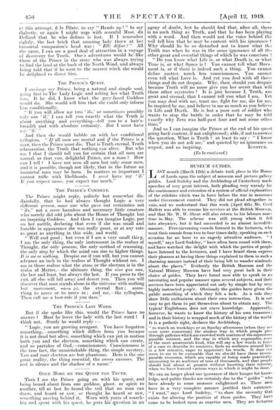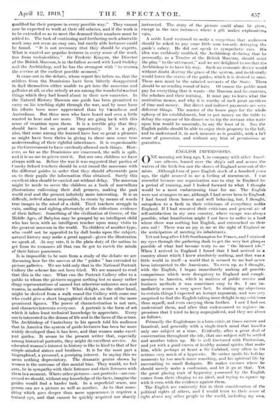MT.ISEI:11 GUIDES.
LAST month (March 12th) a debate took place in the House of Lords upon the subject of museum and picture gallery guides. Lord Sudeley and the Archbishop of Canterbury made speeches of very great interest, both pleading very warmly for the continuance and extension of a system of official explanation of the exhibits which was in force before the war in museums under Government control. They did not plead altogether in vain, and we understand that this week (April 6th) Mr. Cecil Hallett was able to resume his services at the British Museum, and that Mr. W. W. Skeet will also return to his labours 801113 time in May. The scheme was still young when it fell into abeyance, but it had succeeded in an almost incredible manner. Ever-increasing crowds listened to the lecturers, who went their rounds from two to four times daily, speaking on each occasion for an hour to an eagerly attentive audience. " I myself," says Lord Sudeley, "have often been round with them, and have watched the delight with which the parties of people have listened to the lecturers, and I have heard them express their pleasure at having these things explained to them in such a charming manner instead of their being left to wander aimlessly about the places." Evidently the British Museum and the Natural History Museum have had very great luck in their choice of guides. They have found mein able to speak in an interesting and popular manner upon several subjects, and their services have been appreciated not only by simple but by very highly instructed people. Obviously the guides have given the public something of which they felt a leek. As a rule they show little enthusiasm about their own instruction. It is not easy to get them to put themselves about to obtain any. The typical Englishman does not crave knowledge. Apparently, however, he wants to know the history of his own treasures; and in their history is wrapped much of the history of the world. It is a pathetic sight, declares the Archbishop, " to watch on weekdays or on Sunday afternoons (when they am even more numerous) the aimless way in which people pas, through galleries which are crowded with matters of the supreme*. t possible interest, and the way in which any expounder, eve', of the most amateurish kind, who will say a few words in front of a case to describe its contents, finds an audience around him in a few minutes, eager to appreciate his words. It does not seem to me to be excusable that we should have these incom- parable treasures, which are capable of being made practically interesting to an audience of tens of thousands, and that people should loaf about at present without knowing their interest, when we have learned various ways in which it might be clone."
We can no longer plead our ignorance of their hunger for know- ledge, and public thanks are certainly due to the " guides " who have already in some measure enlightened us. These men have in a very complete manner justified their existence. " I want," says Lord Sudeley, " to show the necessity that exists for altering the position of these guides. They have come to be looked upon as superior men. They are lecturers
qualified for their purpose in every possible way." They cannot now be expected to work at their old salaries, and if the work is to be extended so as to meet the demand their numbers must be added to. The task of continuing and furthering such admirable work may not seem an easy one, but surely able lecturers could be found. " It is not necessary that they should be experts. What is wanted are popular lectures in every sense of the word, free from technicalities." Sir Frederic Kenyon, the Director of the British Museum, is in the fullest accord with Lord Sndeley and the Archbishop, and he has the strongest wish " to resume the service at the earliest possible moment."
It came out in the debate, whose report lies before us, that the soldiers from the Dominions have been bitterly disappointed to find themselves either unable to get into the museums and galleries at all, or else utterly at sea among the wonderful ancient things which they had heard about in their new countries. In the -Natural History Museum one guide has been permitted to carry on his teaching right through the war, and by none have his efforts been more appreciated than by Canadians and Australians. But these men who have heard and seen a little wanted to hear and see more. They are going bark with this sense of vexation upon them. It is a terrible pity that they should have lost so great an opportunity. It is a pity, also, that some among the learned have lost so great a pleasure as might have been theirs in giving to these men some true understanding of their rightful inheritance. It is unpardonable in theGovernment to have carelessly allowed such things. How- ever, so far as the Dominions are concerned, the milk is spilt, and it is no use to grieve over it. But our own children we have always with us. Before the war it was suggested that parties of County School teachers should be sent round the museums with the different guides in order that they should afterwards pass on to their pupils the information thus obtained. Surely this excellent idea should be carried out without delay. The museum might be made to serve the children as a book of marvellous illustrations enlivening their dull primers, making the past world real and the present infinitely more interesting. It is so difficult, indeed almost impossible, to create by means of words true images in the mind of a child. Tired teachers struggle in vain, smiling and sighing alternately at the ridiculous evidence of their failure. Something of the civilization of Greece, of the Middle Ages, of Babylon may be grasped by an intelligent child who has been with an intelligent teacher upon many visits to the greatest museum in the world. To children of another type, who could not be appealed to by dull books upon the subject, natural history may make a great appeal—given the illustration we speak of. At any rate, it is the plain duty of the nation to get from its treasures all that can be got to enrich the minds of their future possessors.
It is impossible to be sure from a study of the debate we are discussing how far the success of the " guides " has extended to picture galleries. We are told only that in the National Portrait Gallery the scheme has not been tried. We are amazed to read that this is the ease. What can the Portrait Gallery offer to a public to whom the pictures suggest nothing but so many rather dingy representations of named but otherwise unknown men and women, in unfamiliar attire ? What delight, on the other hand, might be derived from a walk round the Gallery with some one who could give a short biographical sketoh at least of the more prominent figures. The power of characterization is not rare, and eharacterinterests everyone. A portrait is the form of art which it takes least technical knowledge to appreciate. Every one is interested in the drama of life and in the faces of the actors. The Archbishop of Canterbury in his speech told his audience that in America the system of guide-lecturers has been far more widely developed than it has here, and that women make excel- lent guides. It seems to the present writer that, especially among historical portraits, they might do excellent service. An educated woman's interest in history is like in kind to that of her simple-minded sisters and brothers. It is for the most part a biographical, a personal, a gossiping interest. In saying this we mean nothing depreciatory. The dramatic genius shown by women is the outcome of this mental bias. They would, we feel sure, be in sympathywith their listeners and their listeners with them Ma moment. Where other pictures—not portraits—are con- cerned we should, without any knowledge of the facts, imagine the guides would find a harder task. In a superficial sense, one person can see a picture as well as another. As to that some- thing which goes deeper than mere appearance, it requires a trained eye, and that cannot be quickly acquired nor shortly instructed. The story of the picture could alone bh except in the rare instances where a gift makes explanation. vain.
A noble Lord ventured to make a suggestion that audiences should be asked to pay some little sum towards defraying the guide's salary. He did not speak to sympathetic ears. His idea was ruthlessly snubbed, the Archbishop declaring that lie personally, as a Trustee of the British Museum, should resist the plan " to the uttermost," and we are delighted to see that the Archbishop is to have his way. Such an economic device would without doubt destroy the grace of the system, and incidentally would lower the status of the guides, which it is desired to raise. These men must be the salaried servants of the State. Thera should be no sending round of hats. Of course the public must pay for everything that it wants—the Museum and its contents. the scholars and their training. It must pay to learn what the institution means, and why it is worthy of such great sacrifice., of time and money. But direct and indirect payments are very different things. The master of the house pays for the whole upkeep of his establishment, but to put money on the table to defray the expense of his dinner or to tip the servant who wait! upon him would be unseemly, to say the least of it. No; the English public should be able to enjoy their property to the full. and to understand it, in such measure as is possible, with a fu'l sense of possession, and without any hint of permissions or gratuities.




































 Previous page
Previous page